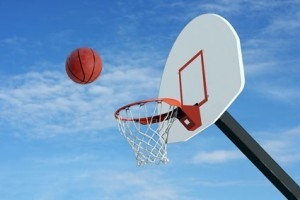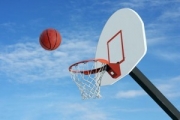BASKETBALL PREPARATION PART III

Keys for Optimal Basketball Performance, part III
Deborah Harris, PT, RD, CLT-LANA
Proper Nutrition
The two nutritional keys for optimal basketball performance are minimizing carbohydrate depletion and staying adequately hydrated. Carbohydrates are the main source of fuel utilized by the body in basketball due to the nature of the game (stop/start, change of direction, speed, jumping, physical contact, etc). Once carbohydrate (blood glucose) stores become depleted players experience fatigue – evidenced by decreased speed, quickness, reaction time, decision making ability, and mental focus.
Hydration is the second key to optimal basketball performance. Symptoms of dehydration are thirst, fatigue, headaches, and muscle cramps. An easy way to monitor hydration levels is to check the color of your urine. Light-colored, clear, odorless urine throughout the day is a good indication of proper hydration. Strong, dark urine may suggest dehydration and indicates that the player must immediately start drinking water and sports drinks until hydrated.
Pre-Practice/Game Meals
A meal can be consumed 2-4 hours prior to practice or games. The further the meal is from the competition, the larger the meal should be and the more lean protein the meal should contain.
The closer the meal is to the competition, the smaller the meal should be. Carbohydrates should be consumed from fruits, vegetables, and grains and should make up the majority of the meal. As a general rule, players eating pre-game should fill 2/3 of their plate with carbohydrates and 1/3 lean protein choices. High fat meals should be avoided in this time period. If a player is prone to muscle cramps during practices and/or games, it is usually due to dehydration and/or potassium depletion. To combat muscle cramps, a player should increase their consumption of potassium rich foods such as bananas, oranges, apricots, avocados, strawberries, potatoes, tomatoes, cucumbers, cauliflower, broccoli, and cantaloupe or he or she should salt their food at the table or consume salty foods like pretzels, crackers, etc.
Pre-game hydration is equally important. Player should begin drinking 16 ounces of water 2 hours before practice or games. Then 30 minutes before a game, a player should drink another 4-8 ounces of water to top off their fluid levels. It is a good idea for players to get into the habit of carrying a water bottle around with them throughout the day to encourage fluid intake during the day.
Game Time Nutrition
Staying hydrated during the game is as important as drinking before and after a game. Water is the most important source and should be consumed every chance a player gets. Sports drinks contain both the fluid and carbohydrate needed to maintain hydration and energy levels during basketball games HOWEVER discretion should be used for players that are not playing for extended periods of time since sports drinks can also add unnecessary calories and sugar as well.
For players competing at high levels and that see a lot of minutes, they should consume a small portion of solid food at half-time to help reload carbohydrate energy. Appropriate foods would be a few bites of an energy bar or granola bar, orange wedges, fruit snacks, and/or fig bars.
Post- Game Recovery
AAU basketball and competitive high school “round robins” are especially challenging in that teams are forced to play multiple games in a row. Obtaining adequate carbohydrate and fluids in a small window of time are keys for optimal performance. A good recovery snack for 140 pound player would be 16 ounce sports drink (water for players seeing less minutes), a banana, and 2 fig bars.
Recovery snacks should be high in carbohydrates, low in fat, and can contain a small amount of protein. Other examples include fruits, raisins, graham crackers, yogurt, pudding cups (low fat), and smoothies. When possible the players should aim to consume a high carbohydrate, low fat meal 1-2 hours after playing to continue refueling the body.
Sports Drinks
Sports/Energy drinks are not all the same. Energy drinks containing caffeine should be avoided at all times (i.e. Red bull, monster drinks, rock star, 6 hour energy, full throttle, AMP, etc.) These drinks are very dangerous and can place players at risk for heart palpitations and excessive sweating.
Sports drinks such as Gatorade and Powerade are good sources of fluid and carbohydrate but contain high amounts of sugar and if players are not careful they can consume excess amounts of calories. If you are fit and lean, are playing at a high level, and see lots of playing time, then a sports drink may be needed before and during a hard workout so your body doesn’t break down muscle proteins for energy. If you do not need the calories, then a sports drink with lower sugar content (G2, made by the manufactures of Gatorade) or water and electrolyte tabs (i.e. Lyte ‘n Go electrolyte tabs) might be more appropriate for replenishing your body.
Optimal Performance
Fearless basketball training combines physical and mental strength and focuses on maximizing performance. Training and playing at an optimal level creates winning reactions and instills a hard-working, positive mentality in teams and their players. According to BeingFirst.com, “For most people, “negative” states of mind such as fear, doubt, and nervousness keep them from the peak experience of the flow, resulting in consistent underachievement of their full capability.”


